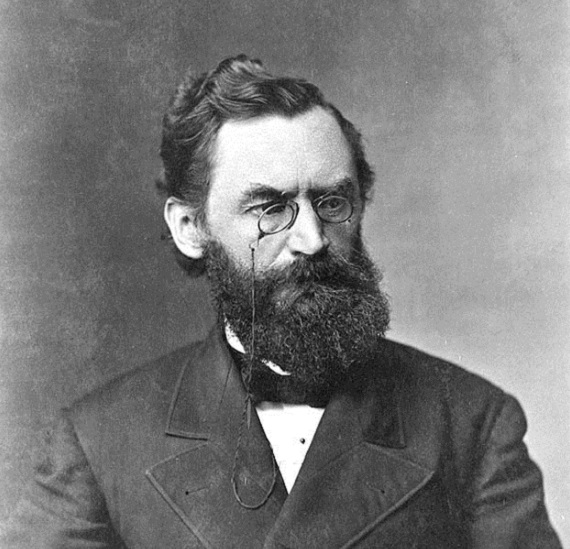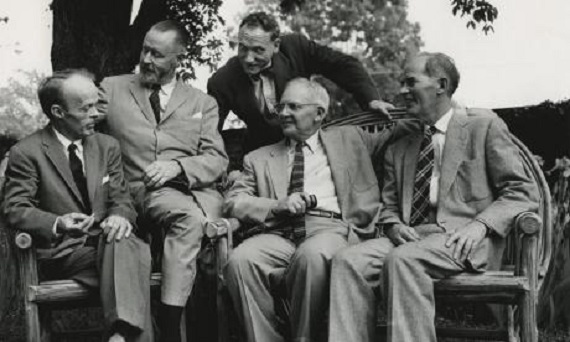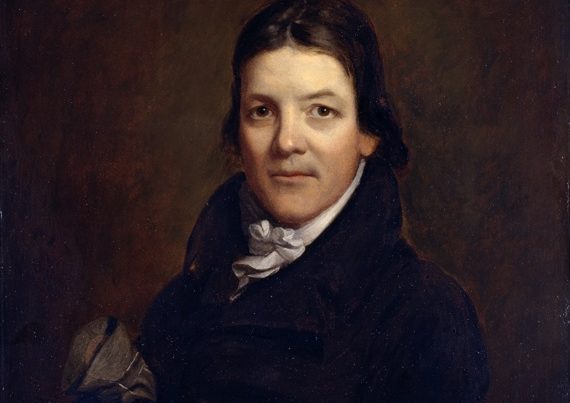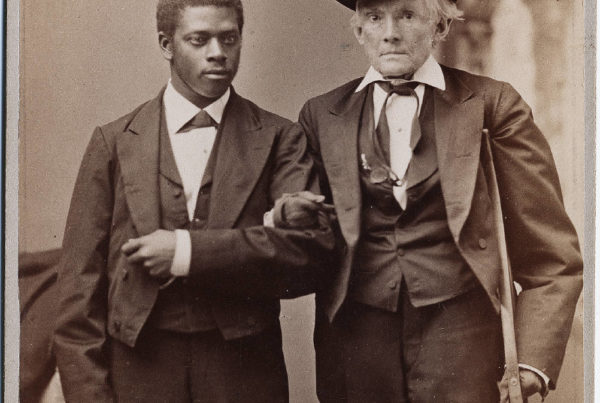How do you achieve peace and normal life after a civil war? Of course the War to Prevent Southern Independence was not really a civil war since the South did not want to control the U.S., just to be let alone. Strictly speaking it was a war of conquest. However, it was in spirit a civil war since it was between Americans who had had a connection before. So the moral question of reconciliation is relevant.
This question was asked and addressed by moderate Northerners, but it is safe to say that the dominant Republicans never asked the question. Their goal was not reconciliation but exploitation, punishment, and maintaining their own power permanently. This is the main theme of the Reconstruction period. The PC historians will tell you that the main theme was the pursuit of equality for black Americans, but that is a fantasy. The Republican party before, during, and after the war never did anything with the primary purpose of helping black Americans. What it did about the freed slaves was incidental to its own goals. There was no burning national mission for equality that was somehow betrayed or abandoned or defeated by a Southern white reign of terror.
In fact, the most extraordinary thing about Reconstruction is the lack of any attention to the aftermath of emancipation. Millions of members of an illiterate, dependent labouring class, of what was considered by all Americans North and South to be an inferior race, were declared free with never a moment’s thought or planning given by their emancipators to how the vast social upheaval was to be carried out. The only real interest in the black people was how they could be used as shock troops to maintain Republican control of the South and thus of the country. Near the end of the war, an abortive peace conference was held at Hampton Roads. Alexander Stephens, Vice-President of the Confederacy, who was genuinely concerned about the welfare of the black people, posed a question to Lincoln. Suppose the South lays down its arms and accepts the results of the war. What was to become of the black people in their present illiterate and propertyless condition? Lincoln’s reply was characteristically flippant, a phrase from a popular minstrel song: “Root, Hog, or Die.” In other words, let them survive as they can.
An economic historian has written: “Northerners expected that the emancipation of the slaves would turn the plantation South into a land of small farms and shops similar to the North. . . . The abolition of slavery would create a free economy with the expected results. Cotton which was the nation’s chief staple would be produced as always but in a free labor system.” Indeed one of the Northern arguments in favour of abolition was the “free labour” was cheaper than slave labour. Slaves had to be taken care of for life while free labour competition brought wages down and troublesome workers could be fired. Such a simple transaction did not happen for many easily foreseeable reasons, among which was the fact that there was no money in the South to pay wages.
One way to bring a sort of peace after a civil war is to exterminate the losing party. The Soviet Communists pursued this policy—exterminating or deporting to the Arctic anybody who was a resister, real or potential. This is the elimination of class enemies to consummate the revolution. There were prominent Northern politicians and preachers who advocated that the South be depopulated and resettled by virtuous New Englanders so that the triumph of the Republican party could be complete and eternal. Note that this involved eliminating the blacks as well as the whites. One of the slogans of U.S. Grant’s presidential campaign in 1868 was “Death to All Traitors.” But that was hardly possible because Southerners would not have sat still and waited to be eliminated and the opinion of mankind would have been outraged. The Reconstruction policy actually adopted was the next best thing—the maximum oppression possible short of continued war.
All Americans agreed that we were governed by the people—they were the supreme authority. This was understood to be expressed by a convention of the people in each State that had been elected with plenary constitutional power beyond the ordinary legislative power. It was these instruments of the people’s will which had dissolved each State’s connection to Great Britain—even before the joint Declaration of Independence. It was such conventions that were necessary to ratify the U.S. Constitution on behalf of the people of the State. It was such conventions that wrote constitutions for the new States and created them as polities in the Union of States.
It was such conventions that carried out secession in the Southern States. It was very simple. The people in their sovereign capacity had ratified the Constitution and assented to the Union. They were now, in their sovereign capacity, repealing that act and thus dissolving their connection with the other States under the title United States of America. Such a convention was to be elected only under extraordinary circumstances. In South Carolina, for example, a convention had to be ordered by a two-thirds majority in both houses of the legislature before it could be elected and convened.
In response, Lincoln refused to recognise the States at all. He pretended to believe that a nation had been created in 1776 which could not be dissolved and that the States were only subsidiaries of the federal government. Disobedience to the federal government was, according to this theory, being carried out not by states but by merely “combinations” of lawbreakers. These criminals were too many to be curtailed by the usual U.S. Marshal’s posse, so he had to call out the army. In the usual revolutionary formula, if any violence ensued, it was the fault of the criminals.
This argument had nothing to do with the Constitution, history, or any deep political philosophy. It was a lawyer’s argument to make the best out of a bad case. Thus Lincoln refused to deal with States and inaugurated the war. In essential agreement with Lincoln’s stated position, Congress when it met passed a resolution declaring the war aims of the U.S. government to be limited—to defeat secession and restore the States to their rightful place as part of the United States.
This is a resoundingly dishonest position because the Union could only be restored by destroying the legal governments and the will of the people of the Southern States. Thus they could no longer be States, equal members of the Union and what would result would not be a Union but a new unappealable federal power. This was justified by vague pretense that secession was not really the will of the people of the States. They had just been driven or duped to it by a conspiracy of disunionist slavery fanatics. This is still repeated daily by historians but it is patently false as anyone can see by the election statistics and the vigorous debates that accompanied the acts of secession. It is possible that Lincoln actually believed this. At any rate he was a politician who operated by posturing and patronage. He believed that if he took a tough stand Southerners would soon come around and obey him. He did not understand that they lived in a different moral universe. Although many people told him so, he did not believe that the upper South states would secede and double the strength of the Confederacy if he ordered invasion. It was one of the greatest mistakes in history.
But the notion that the war was to make the States give up secession and restore them to the Union remained influential. It is reflected in the Emancipation Proclamation which purported to free the slaves only in the States or parts of States deemed to be still in rebellion. The Northern War Democrats claimed adherence to this notion. Any Democrats with real principles and guts openly denounced Lincoln’s war as illegal and barbarous. They often found that soldiers battered down their doors in the middle of the night and carried them off to a damp military prison without any benefit of due process. But McClellan’s official Democratic position when he ran against Lincoln in 1864 was “The Constitution as It Is and the Union as It Was.”
For this reason McClellan and some other commanders wanted to fight the war army against army to settle the question of secession. It was not wise to make war on the civilian population who were expected to return one day as fellow citizens. However, this policy was never approved by Lincoln and the Republicans. In fact, from the first, every single day in every theatre of the war Northern soldiers stole and destroyed private property and oppressed Southern women and children. Sherman’s March is only a conspicuous example of regular policy. This, of course, was guaranteed to retard the presumably desired restoration of the Union.
Another obstacle to reconciliation was the Confiscation Acts. In 1862 Congress authorised the Treasury Department to send agents with the armies to collect taxes and seize property where not paid. Since many people moved out of the way of the invading Yankee armies, this was a neat trick. The next year there was an Enemy and Abandoned Property Act which allowed the seizure of any Southern property left in the wake of the Northern armies. A lot of land was acquired by Northerners who took over the operation of plantations expecting to make a fortune. There is abundant testimony that they treated the black workers much worse than their old Southern masters. The U.S. Army often returned runaways to these new-style plantations. One such plantation was acquired in Florida by the great abolitionist Harriet Beecher Stowe.
But the main purpose of the law was to steal cotton, an immensely valuable commodity for which the North and indeed the world had an insatiable demand. This continued for years after the war. The confiscated cotton was supposed to be turned over to the government. It is estimated that $100,000,000 was seized but only about $2 million ever reached the treasury. This indicates the general level of honesty of the federal officials during the war and Reconstruction. Ambrose Bierce, who had been a brave Union soldier throughout the war, was sent South as a Treasury agent. He was so disgusted that he started helping the locals hide their cotton from corrupt feds. A Secretary of the Treasury commented that he must have sent a few honest men South but none remained that way very long. Indeed, during the war, operations of the Union forces had sometimes been designed for stealing cotton rather than for any military objective and numerous prominent Northern generals became rich men as a result. There seems to be a general assumption that all this corruption mysteriously took hold after the noble Lincoln was out of the way. But it began under Lincoln’s war with unprecedented expenditures and bureaucracy.
The notion of a restored Union was still potent enough at the end of the war that when Lee surrendered to Grant and Johnston surrendered to Sherman, they were led to believe that the existing State governments of Virginia and North Carolina could continue to function if they disavowed secession. This deception caused General Lee to say privately after the war that if he had known what Radical Reconstruction was to be he would have fought to the end.
The war is over and the Republicans are presented with a stark prospect. They were a revolutionary cabal that had enjoyed immense power and profit from their control of the government. But their hold on the North was never perfect. If the South returned to the Union, the Republican position would be threatened by a coalition of Southerners and Northern Democrats. Honesty and consistency had never been their strong suit. If the Republicans had been honest men, there would have been no need to secede from them to begin with. Thaddeus Stevens now discovered that the States were not States at all but conquered territory whose land and people could be disposed of totally at the will of Congress. Charles Sumner, with his usual attempt at sounding learned, gave this his own twist: the States had committed suicide and no longer existed. They were inhabited by traitors with no rights and loyal black people who were potential Republican voters.
There were attempts by Lincoln and Johnson to develop a somewhat lenient plan of Reconstruction, resulting in a struggle between the executive and the Republican Congress for dominance and the trumped up impeachment of Johnson. This is interesting but perhaps too involved to detail here. Essentially under the Lincoln plan, any Southerners who took an oath of future loyalty could vote and return to normal life and State governments could be set up and resume function after meeting a few conditions. The great advocate of democracy Lincoln allowed a State government to be set up when a number of voters equal to 10 per cent of the 1860 electorate had taken the oath. This is even worse than it sounds because the 10 per cent contained a large contingent of carpetbaggers and Union soldiers. However, this was much too lenient for the Republican leaders.
A major scenario in American folklore was that there would have been no harsh Reconstruction if Lincoln had lived. His superhuman humanity and mercy would have brought peace and reconciliation. If you examine Lincoln’s acts and words up to his death, there is some support for this. But, don’t forget, Lincoln was a master politician who did whatever was necessary to stay in power.
Under Johnson, governments were restored. They willingly ratified the 13th Amendment. Indeed most Southerners expressed relief that slavery was at an end. Ex-Confederates with very few exceptions accepted the outcome of the war and went to work quietly to secure a livelihood in desperate circumstances. During the period 1865 – 1866, under what was called Presidential Reconstruction, there was general peace. Numerous Northern travellers reported that the South was peaceful and the rebellion over and that the Southern people were in such devastated condition that further punishment was unthinkable. Johnson sent Grant, who had not yet been recruited by the Radicals, on a Southern tour, and he reported the same thing. However, the Union general Carl Schurz, an immigrant from Prussia, reported that Southerners had not acknowledged their treason and criminality and stern measures were needed. Southerners, men of honour, had said they had accepted the outcome of the war and they meant it and behaved accordingly. However, they did not grovel and admit they were wrong and ask forgiveness, which to the Puritan conqueror was unforgivable. The Republicans became even more uneasy when former Union and Confederate soldiers met in a convention in Philadelphia to forward a genuine restoration of the Union by the Democratic plan of reconciliation.
Though the South was peaceful and rebuilding in the first period after the war, it played into the hands of the Radicals in several ways. It sent men to Congress (who were not received) who had been Confederate. Hardly anyone else was available. In every case these were men who had been reluctant secessionists but had shared the fate of their people, but this was a bad propaganda move. The greatest obstacle to a return to normal life in the South and getting to work was the wandering black population. Many black people stayed where they had always been. Others, with a natural desire to test their freedom, moved around under the impression that work was no longer necessary. Historians don’t seem to understand that when the Union army devastates an area, the black people as well as the white go without food and housing. There was a large population surviving mainly by stealing food from people who had very little. The South was full of widows living isolated in the country. To address this, Southern legislatures passed what were called “Black Codes.” These were merely copies of Northern vagrancy laws under which people with no visible means of support and fixed residence could be compelled to work for a period of time. The Republican propaganda machine labeled this as an attempt to reinstitute slavery.
This was sold to the Northern public by the propaganda campaign I previously mentioned, in which the South was portrayed as living under a reign of terror by unrepentant traitors. Also, by Northern fear that blacks unhappy in the South might head North. The progress of Presidential Reconstruction was deliberately and with malice aforethought destroyed after a few months as Congress took over the South on the conquered territory theory. The Southern State governments were thrown out and the South divided into military districts under the command of generals. A new oath was prescribed, which required one to swear not only that he was “loyal” now but that he had never aided the Confederacy. This effectively barred 85 per cent of the white men from voting or exercising any other right of citizenship, including practicing a licensed profession or business. The conquered States were to write new constitutions under governments elected by the new franchise of black, carpetbagger, and native Unionist voters. They might be readmitted to the Union and representation in Congress when the government approved their new constitutions and they ratified the 14th Amendment. Elections were held for state and local offices in which most of the real citizens could not vote and the state and local offices filled by people who had just arrived or by recent slaves who were often illiterate and without any sense of law.
The carpetbaggers conducted the elections under army protection and when they did not turn out right simply threw out the results and reported whatever they wanted. One of the common PC indictments of Southern whites is that in defeating Reconstruction they sometimes turned to intimidation at the polls. It is not mentioned that the Republicans had already totally discredited the election process by fraud and intimidation. The real Reconstruction was now in effect. It was essentially a regime of force such as Americans had never before seen or lived under. This the Southern States lived under for up to a decade until it was overcome by various combinations of actions and circumstances.
SOURCE: From The Abbeville Summer School, July 2009.







